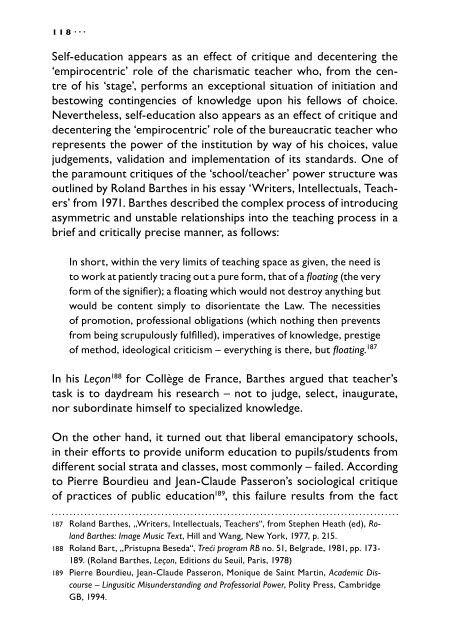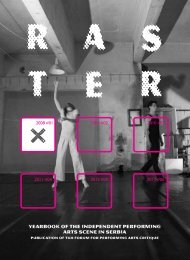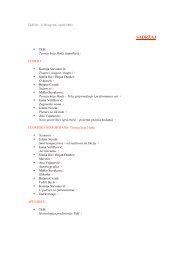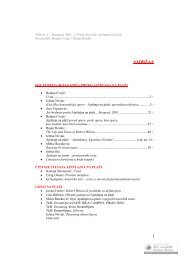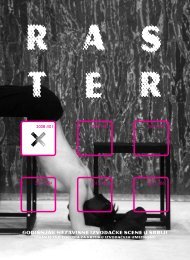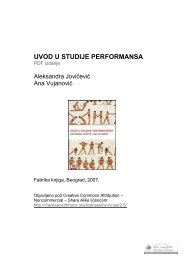Miško Šuvaković Epistemology of Art - TkH
Miško Šuvaković Epistemology of Art - TkH
Miško Šuvaković Epistemology of Art - TkH
You also want an ePaper? Increase the reach of your titles
YUMPU automatically turns print PDFs into web optimized ePapers that Google loves.
118··· ··· 119<br />
Self-education appears as an effect <strong>of</strong> critique and decentering the<br />
‘empirocentric’ role <strong>of</strong> the charismatic teacher who, from the centre<br />
<strong>of</strong> his ‘stage’, performs an exceptional situation <strong>of</strong> initiation and<br />
bestowing contingencies <strong>of</strong> knowledge upon his fellows <strong>of</strong> choice.<br />
Nevertheless, self-education also appears as an effect <strong>of</strong> critique and<br />
decentering the ‘empirocentric’ role <strong>of</strong> the bureaucratic teacher who<br />
represents the power <strong>of</strong> the institution by way <strong>of</strong> his choices, value<br />
judgements, validation and implementation <strong>of</strong> its standards. One <strong>of</strong><br />
the paramount critiques <strong>of</strong> the ‘school/teacher’ power structure was<br />
outlined by Roland Barthes in his essay ‘Writers, Intellectuals, Teachers’<br />
from 1971. Barthes described the complex process <strong>of</strong> introducing<br />
asymmetric and unstable relationships into the teaching process in a<br />
brief and critically precise manner, as follows:<br />
In short, within the very limits <strong>of</strong> teaching space as given, the need is<br />
to work at patiently tracing out a pure form, that <strong>of</strong> a floating (the very<br />
form <strong>of</strong> the signifier); a floating which would not destroy anything but<br />
would be content simply to disorientate the Law. The necessities<br />
<strong>of</strong> promotion, pr<strong>of</strong>essional obligations (which nothing then prevents<br />
from being scrupulously fulfilled), imperatives <strong>of</strong> knowledge, prestige<br />
<strong>of</strong> method, ideological criticism – everything is there, but floating. 187<br />
In his Leçon 188 for Collège de France, Barthes argued that teacher’s<br />
task is to daydream his research – not to judge, select, inaugurate,<br />
nor subordinate himself to specialized knowledge.<br />
On the other hand, it turned out that liberal emancipatory schools,<br />
in their efforts to provide uniform education to pupils/students from<br />
different social strata and classes, most commonly – failed. According<br />
to Pierre Bourdieu and Jean-Claude Passeron’s sociological critique<br />
<strong>of</strong> practices <strong>of</strong> public education 189 , this failure results from the fact<br />
187 Roland Barthes, „Writers, Intellectuals, Teachers“, from Stephen Heath (ed), Roland<br />
Barthes: Image Music Text, Hill and Wang, New York, 1977, p. 215.<br />
188 Roland Bart, „Pristupna Beseda“, Treći program RB no. 51, Belgrade, 1981, pp. 173-<br />
189. (Roland Barthes, Leçon, Editions du Seuil, Paris, 1978)<br />
189 Pierre Bourdieu, Jean-Claude Passeron, Monique de Saint Martin, Academic Discourse<br />
– Lingusitic Misunderstanding and Pr<strong>of</strong>essorial Power, Polity Press, Cambridge<br />
GB, 1994.<br />
that in ‘emancipatory liberal schools’ the knowledge transfer appears<br />
as detached from social inequalities. In other words, such schools<br />
have been raising a ‘fence’ against the society, while seeking the ideal<br />
autonomy <strong>of</strong> educational processes. They failed to adapt their educational<br />
content (exert particularization <strong>of</strong> universal knowledge) to<br />
students from different social strata, notably those excluded – due<br />
to family background – from high elite culture. As opposed to the<br />
liberal emancipatory school, ‘republican school’ – e.g. according to<br />
Jules Ferry – also used protection <strong>of</strong> the school walls against social<br />
inequalities, but not to lower its criteria, but to provide a fair encounter<br />
with universal knowledge to all its beneficiaries, whereas position<br />
<strong>of</strong> the teacher was in critical and auto-critical terms submitted to<br />
assessment and discussion, determinated as it was by essential educational<br />
disparities between the one who knows and the one who is being<br />
taught. Both liberal and republican models faced contradictions pertaining<br />
to the ‘right to knowledge’, and relations between particular<br />
and universal knowledge. Furthermore, Jacques Rancière notes that<br />
engagement with contemporary school in mass market conditions <strong>of</strong><br />
contemporary ‘democratic individualism’, manifests itself as ‘average<br />
knowledge’ for the equal or equal knowledge for the indifferent. 190 In<br />
his lectures on intellectual emancipation 191 , Rancière pointed out the<br />
contingencies <strong>of</strong> activation and engagement <strong>of</strong> creative intelligence,<br />
ever to open and govern the learning process. He started from a<br />
strong argument that all humans possess potentialities <strong>of</strong> intelligence,<br />
whereas the very process <strong>of</strong> education contains elements <strong>of</strong> inequality<br />
eventually to be externalized. What propels students’ intelligence<br />
is not the ‘master’ 192 , but their desire/will to know, and that will –<br />
regardless <strong>of</strong> their social status – excels in learning as emancipatory<br />
change. Rancière’s philosophy <strong>of</strong> education reclaims the role and im-<br />
190 Jacques Rancière, „Od pobjedonosne do zločinačke demokracije“, from Mržnja<br />
demokracije, Naklada Ljevak, Zagreb, 2008, pp. 33-42. (Jacques Rancière, La haine<br />
de la démocratie, La Fabrique, Paris, 2005)<br />
191 Jacques Rancière, The Ignorant Schoolmaster: Five Lessons in Intellectual Emancipation,<br />
Stanford Univetsity Press, Stanford CA, 1991.<br />
192 Jacques Rancière, „An Intelectual Adventure“, from The Ignorant Schoolmaster: Five<br />
Lessons in Intellectual Emancipation, Stanford University Press, Stanford CA, 1991,<br />
pp. 1-18.


